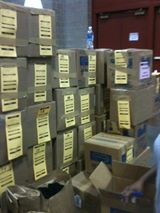 “Wow. I really like your selection. Where do you get your books?” the Customer asked. Little did he realize that I have a good understanding of customer-speak. Beneath his seemingly simple question lies his true thought: “I have a bunch of books I don’t need, and probably never read, and possibly my great-aunt Tilly left me her collection of Harlequin Romances from the 1980s, and I want you to take them and give me either money or store credit so I can get that signed Jo Nesbo first edition that you are selling for $40.”
“Wow. I really like your selection. Where do you get your books?” the Customer asked. Little did he realize that I have a good understanding of customer-speak. Beneath his seemingly simple question lies his true thought: “I have a bunch of books I don’t need, and probably never read, and possibly my great-aunt Tilly left me her collection of Harlequin Romances from the 1980s, and I want you to take them and give me either money or store credit so I can get that signed Jo Nesbo first edition that you are selling for $40.”
“Sure!” I said. “Please bring me all these books that I will have my staff process and stock, where they will sit for years with zero sales, taking up room where I could have placed some actual good-selling books, and then in a few years my employees will remove them from the shelves and throw them in the dumpster. Assuming, of course, I’m still in business at that point.”
There was a time in the used book business that stores were at the mercy of the customers as far as acquiring books. We often would take some lesser quality items just to get a few bestsellers or good-selling backstock. Customers, however, ignored the lesser quality items, cherry-picked the good ones, and later brought in more lesser quality books to trade for store credit. Eventually, I had a store full of junk, with limited choices for the more discerning reader.
In 2004 I decided the only solution was to computerize the inventory. I found a smaller software company that offered a monthly fee with no contract and no charges for inventory updates. Grimly, I went through all my stock, discarding anything I thought was unsellable. I whittled my stock down to the bone, and painstakingly computer tagged each and every one of them and vowed to do the following:
Be picky about what to take on trade, because your good customers are picky about what they take out. Have no qualms about turning a book down if you don’t think there’s a chance to sell it in 3 years. Your book inventory system should tell you the sales history of a book and author. Also, the same system should give you the Amazon sales rank. A nice looking book from 2008 that has an Amazon sales rank of 5,300,350 is probably not going to sell in your store.
Use Ebay to find interesting book lots. A lot of the books on Ebay are way too pricey for the retail trade, but there are gems to be found. I recently purchased a 100-book lot of Louis L’Amour westerns for $125.00 delivered. We priced them at $2.50 a unit minimum, and they continue to turn over and over. Author lots tend to be my favorite, as mixed lots often have way too much filler.
Library Sales. Absolutely essential, especially if you have access to larger library systems. Imagine handpicking your inventory, finding the latest James Lee Burke paperback or a bunch of Jodi Picoult trade size novels for $1. While other patrons are looking at ex-library children’s books or trying to scout rare books, searching for the Great White Whale of books , you are grabbing James Patterson novels that you can sell for $5.00 a pop on an every day basis. My customers love certain inspirational authors, so I load up on Max Lucado, Joyce Meyer, and Joel Osteen. And classics. Don’t skimp on the classics, especially ones with nice, catchy covers.
The Bookstore is an Aquarium. You need to clean it out on a regular basis. I purge the shelves regularly, focusing on books that have been there more than three years. If it hasn’t sold by then, odds are against it selling and using my acquisition system, I can definitely find something better to fit in its slot. Be ruthless. Oh, and don’t tell your customers you throw away books. They seem to take it quite personally at times.
The Customer was opining on the virtues of a small bookstore she enjoyed going to while on vacation. “You ask the owner for a book, and if she had it, she knew right where it was!” she gushed. “And they had the cutest cat! You should have a bookstore cat!” Yes, I thought, I used to remember where all my books were too. That’s because I walked by them every day and they never sold. These days, when I use my memory to find a book for a customer, I usually can’t find it, and when I go back to the computer to look it up, I find out it’s already sold.
“We have all the James Patterson’s you want in stock,” I said. “My helper is grabbing them up as we speak. Oh, and we have too much customer traffic to have a cat. Afraid he might get stepped on. Debit card is fine.”
